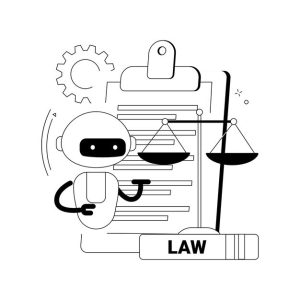Have You Heard the Buzz?
AI is transforming the legal world although law practitioners who avoided technological advances now demonstrate their acceptance of changes.
Legal practitioners face the pressing need to analyze huge data quantities efficiently and precisely within modern fast-paced legal systems. An exponential rise in client requests as well as court requirements and regulatory needs now presents an unprecedented difficulty for staying competitive. The arrival of AI brings benefits to law firms by optimizing their workflow and improving accuracy rates together with overall efficiency levels.
AI operates through machines which enhance performance while learning from their own experiences instead of performing limited programmed operations. The smart systems combine their abilities to evaluate legal documents as well as notice typical sequences which leads to precise outcome predictions including questions that can surpass human diagnostic capabilities.
The use of artificial intelligence technology holds which advantages for your law firm? Seven major benefits emerge from utilizing AI-powered solutions as explained below.
1. AI Saves Time
Your firm’s main valuable resource is time while AI significantly decreases the duration needed for monotonous repetitive efforts. AI-powered tools can:
- The new digital system shows lawyers how to handle legal documents within minutes compared to traditional manual work that requires hours of review.
- Records research operates at speeds beyond what human lawyers can achieve.
- The identification process for case law statutes and regulations achieves elevated accuracy results.
- Programs inspect and detect inconsistencies in documents immediately.
The practice of automation allows law firms to invest their staff and resources into essential legal work such as developing client strategies and case preparation.
2. AI Enables Earlier and More Accurate Risk Assessment
AI tools offering both technology-assisted review (TAR) and predictive coding help lawyers perform real-time legal risk assessments in their practice. Such functionality greatly helps law firms in two key areas.
- Litigation: AI enables lawyers to find discoverable information promptly so they can adhere to deadlines and secure important data at court.
- Compliance: AI-based compliance monitoring tools examine possible violations to spot dangers at earliest stages and prevent them from worsening.
- Contract Review: AI technology evaluates contracts to discover potential risks together with missing sections along with contradictory contents.
Lawyers who notice risks at their early stages provide protective legal counsel that avoids expensive conflicts between parties.
3. AI Produces Higher-Quality Work
AI tools unlike human attorneys do not face work-related fatigue nor do they get distracted by events nor do they make oversight errors. AI-powered document analysis tools can:
- The system ensures document consistency by spotting terms that are missing or combined incorrectly.
- Professional legal validators must follow-up to ensure that all references along with citations remain correct.
- The normalization of verbalization should occur throughout different versions of documents along with standardized language use.
Through error-free performance AI generates high-quality legal work which delivers better results to clients.
4. AI Enhances Organizational and Logical Structure
Artificial intelligence in legal software helps create orderly documents through the following processes:
- Examining multiple legal documents helps detect elements which are absent from the contracts.
- The software provides professional suggestions about how to strengthen legal arguments and methodology within memoranda documents.
- Computer programs organize legal files alongside emails and research documents to enable simple document retrieval.
Via AI technology lawyers can optimize their operations systems while removing unnecessary steps for better overall efficiency in their work and complete essential details verification.
5. AI Enhances Creative Analysis and Case Strategy
Instead of eliminating legal professionals AI grants them the ability to use advanced tools which make them more strategic and analytical. Lawyers who automate regular tasks gain the ability to:
- Your main objective must be developing convincing legal positions together with effective case plans.
- AI platforms help attorneys assess various legal principles through their search capabilities.
- AI systems help users locate persuasive legal cases with speedier and improved effectiveness in their search process.
AI automation liberates legal experts for advanced problem-solving enabling them to develop better legal strategies which enhance their creativity.
6. AI Reduces Attorney Stress and Frustration
The combination of legal work with AI technology lessens pressure because it takes over monotonous and recurring assignments. AI-powered tools:
- The initial phase of document examination by AI reduces the amount of work that attorneys need to handle.
- Users can use AI technology to conduct legal research tasks that would otherwise require lengthy case law examination.
- The system performs flawless proofreading tasks to remove the stress from performing manual document revisions.
Lawyers using Artificial Intelligence report less professional fatigue while attaining higher job contentment and freeing up more time to handle primary legal tasks.
7. AI Improves Client Relations
The implementation of AI technologies enables law practitioners to deliver exceptional support to their clients through more efficient and structured work procedures. AI enhances client relations by:
- Law firms that reduce the time needed for legal work completion.
- The system provides better visibility through automatic real-time feedback containing precise legal information.
- Advanced clients can benefit from their lawyers’ increased availability since AI lets them dedicate more time to consulting and delivering bespoke professional advice.
Clients experience shorter wait times for correct legal support that generates both better customer contentment and enhanced lawyer-client professional relations.

Final Thoughts
AI implementation in law practice produces connected gains because it saves time while cutting expenses and creates fewer errors through automation which delivers better client service. Following the implementation of AI solutions law firms will obtain enhanced productivity levels together with minimal error rates while delivering exceptional legal services.
AI acts as an organizational tool which strengthens the capabilities of lawyers. AI technology allows legal professionals to perform their exceptional abilities in strategic analysis and creative issue resolution by taking over repetitive workloads. Legal organizations that adopt modern AI technologies will achieve improved market performance in the legal sector as AI technology advances.
Has your law firm obtained the necessary readiness to implement AI solutions for achieving optimized effectiveness and business achievements? It is essential to hunt down new opportunities at this moment.










